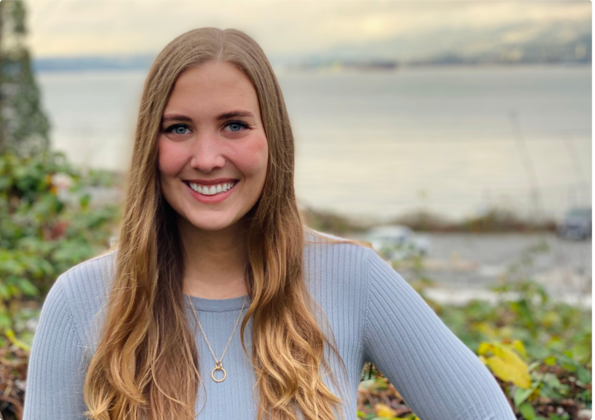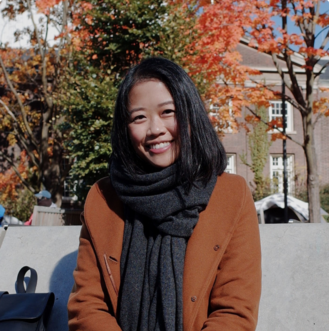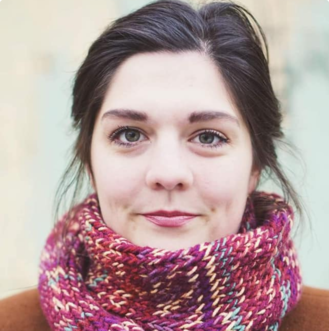Student Profile
Emma Speakman
Content Designer at Facebook
Course Taken
UX Design Course
Key Skills Learned
- User Research
- Sketching and Wireframing
- Prototyping

Interview
Where do you currently work and what do you do there?
I currently work at Facebook as a Content Designer.
Our job titles recently changed – we were called Content Strategists before this. UX Writer is another word that's used for my discipline. I work on the product teams, partnering with design and research, and I’m responsible for how content is displayed in the User Interface (UI) and what it says.
I work on the Messenger team at Facebook, and I work really closely with my product managers and designers to think about how content should be displayed within the user experience of those products.
Outside of my product work, I also focus on accessibility. I actually train all of the incoming Content Designers now on how to write for screen readers. That's something I'm really passionate about.
What would a typical day look like for a Content Designer?
I would say every day is different and that's why I love it. There are lots of meetings with your partners and figuring out what's on the roadmap. I split my time between content-led projects, and working with my product teams on new experiences.
I also spend a lot of the time fixing problems that Engineers bring to our attention. They sometimes need a Content Designer to weigh in on problems that need a content solution.
It’s really dynamic and I get to work with a lot of different teams.
Tell us about your education and career background. How did you get to where you are?
I started in Communications and Media Studies and then went on to get an English degree with a minor in Journalism. After I finished school I wasn't really sure what I wanted to do. I worked in film a bit, for a management company. I worked in fashion which was not a fit and then finally landed a copywriting job. I was able to shift from copywriting into a UX writing job at Best Buy, where I was one of the first UX Writers there. I was there for about four years until I got recruited to work at Facebook.
Why did you choose to study at BrainStation?
I was curious about product design in general when I was at Best Buy, there were UX Designers and UI Designers, and I was just curious. I knew I didn't have the visual design skills, but I was curious about UX because I thought wireframing and understanding the user journey was something I was pretty passionate about – I loved working with the UX Designers at Best Buy.
I was curious if I would be interested in that and just wanted to learn more about it. I had a couple colleagues who actually taught at BrainStation and other colleagues who had taken courses with BrainStation and it seemed really accessible. I was able to dip my toes in the water and see what UX was all about.
What would you say was the highlight of your learning experience at BrainStation?
I really liked the class project. I liked being able to practice the skills we learned in class and figuring out what your product was doing, creating the wireframes, and getting feedback from the Instructors.
I created an app that helped people find apartments, and specifically, roommates. My project was like a dating app but for housing, where you could look for a roommate through mutual friends, or someone who you shared common interests with.
How would you say that the BrainStation experience impacted your career?
I feel a lot more comfortable with the UX design language. I understand the process and I understand the values and how design is a key component in the UX writing field.
A lot of the time people coming into the UX writing or content strategy fields have a journalism or English background, or maybe they've worked in advertising as a copywriter. That UX piece is really valuable and the course really helped me gain a high-level understanding – It made me feel more competent in that area and that’s been really valuable in my career.
What were the most valuable skills you learned?
Understanding user flows and the user journeys really helped. It lets you look at problems with fresh eyes and with a really broad scope. What problem are we trying to solve? I think asking that question really helps. The course really teaches you how to frame and think about solving problems.
Understanding user flows and the user journeys really helped. It lets you look at problems with fresh eyes and with a really broad scope. What problem are we trying to solve? I think asking that question really helps. The course really teaches you how to frame and think about solving problems.
What advice would you give to other professionals out there that are considering taking a brain course or program?
If there’s something that you're curious about- I would say just do it. The part-time courses really help you explore something that you're interested in without like fully committing. Just explore. Don't be shy, it’s always good to learn more. Even if it's not what you end up doing professionally – I think it's a great way to discover if it’s something you really want to commit to and do more of.
Get Started
Ready to Become the Next Success Story?
Join a network of over 250,000 professionals who are transforming and accelerating their careers through cutting edge tech skills.
- Discover new courses and programs
- Learn about tuition, payment plans, and scholarships
- Get access to VIP events and workshops


